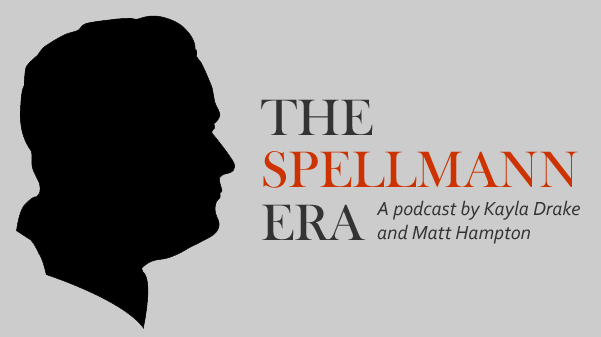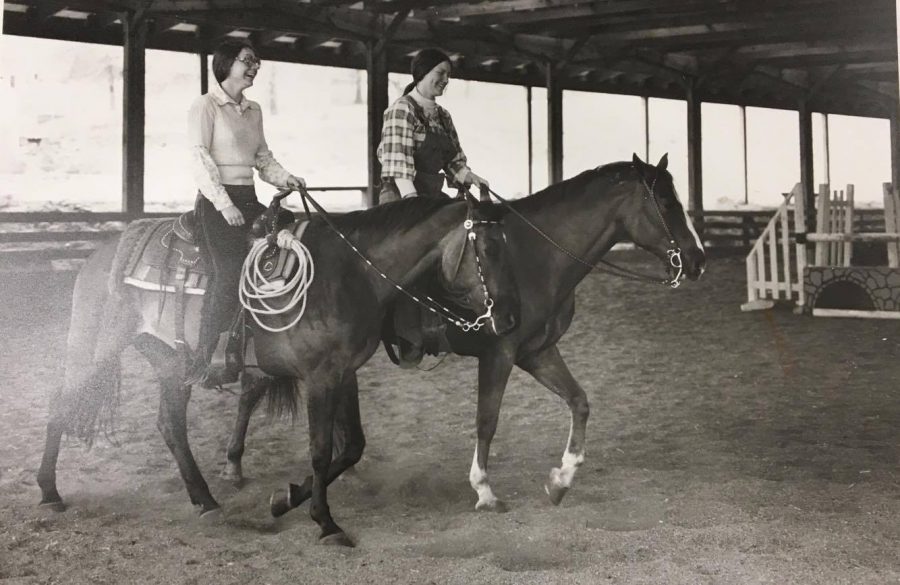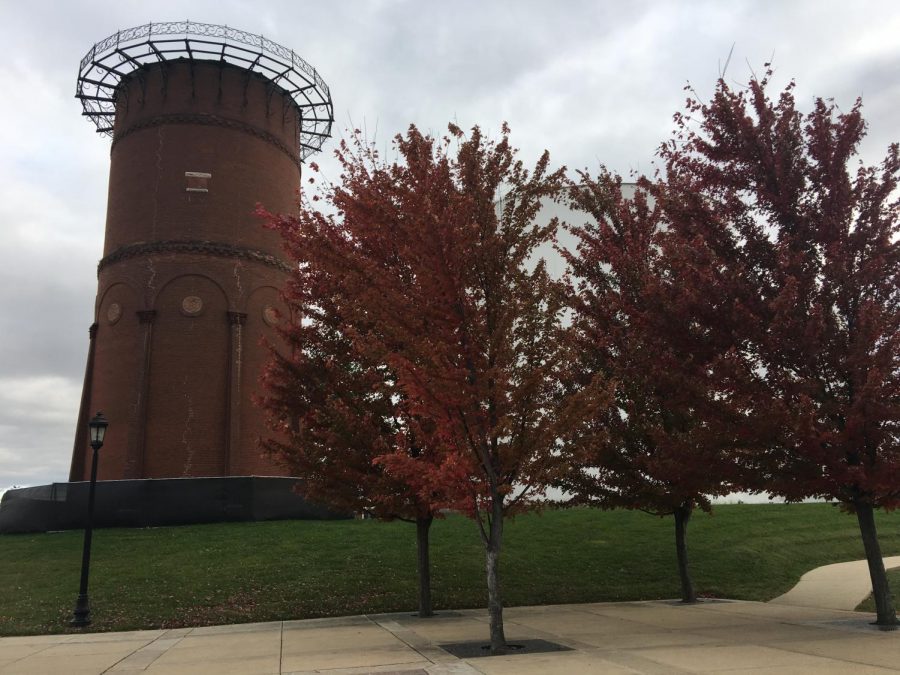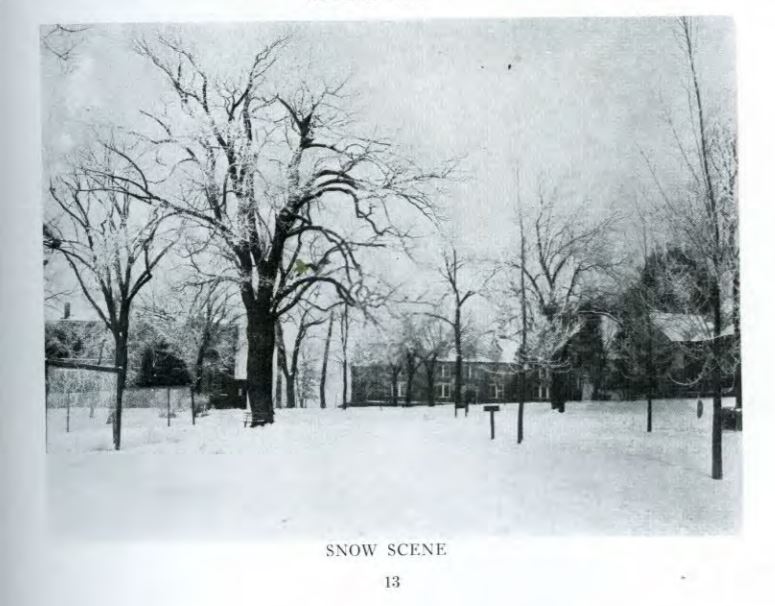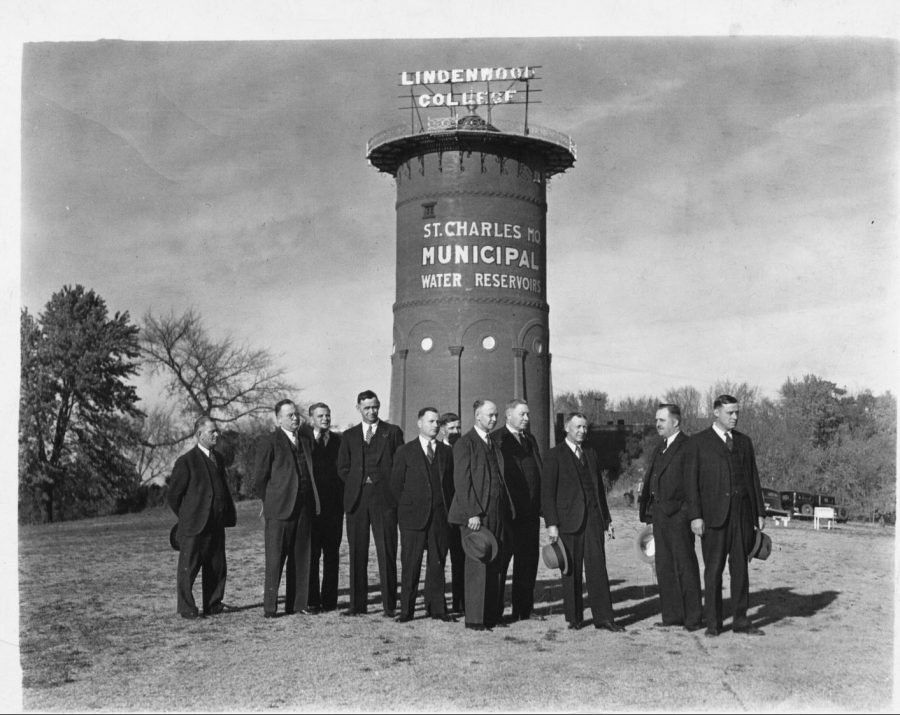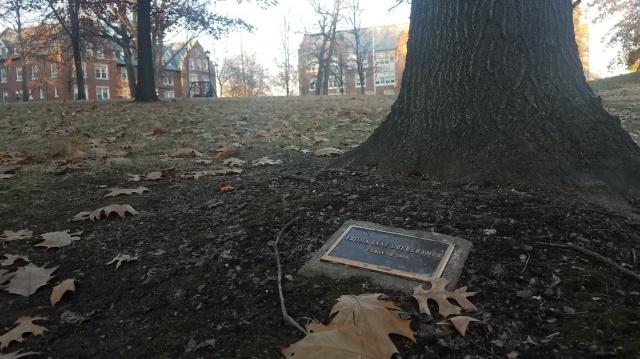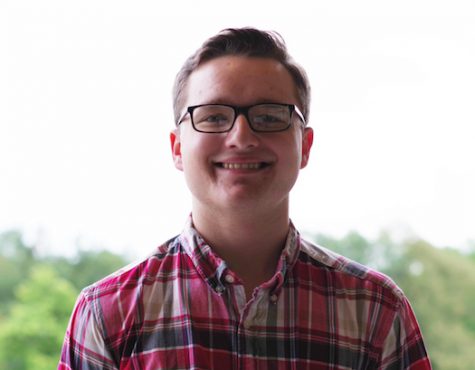KAYLA DRAKE | Host
MATT HAMPTON | Producer
This is the third episode in a four-episode documentary podcast series about Dennis C. Spellmann, president of Lindenwood from 1989-2006. Click here for the previous episode, and here for the final installment. A transcript of the episode is below. A list of sources is here.
Kayla Drake: Before Spellmann became president in 1989, Lindenwood had a relaxed, liberal atmosphere, with alcohol-infused parties in the dorms, jungle juice-filled tubs in Irwin, food fights in the cafeteria, paranormal pranks pulled in the Sibley Chapel, all-night poker in the basement of Niccolls Hall – the stories go on and on.
But once Spellmann came, students became upset that they lost the freedom they used to have.
And among professors, some remember the Spellmann era as hard work. Because of cuts to staff, many of their duties were shifted to faculty.
Spellmann increased the number of classes professors had to teach from three to five. Often, professors had to teach even more if class sizes were small.
Professor Richard Reighard: Spellmann did not look at it as an academic – he was a businessman.
KD: That’s Mass Communications professor Rich Reighard.
RR: So he looked at it as “I’m paying you X amount of amount of dollars and Gee, you know,” – and particularly for someone into the arts you know, some of the studio classes where they taught five classes but they only had six or seven people each, and it’s like, “wait, I’m paying you $80,000 to teach 12 students? That’s not very economical.”
KD: Besides being a challenging amount of work, some professors worried that the large class sizes were detrimental to personalized education.
RR: There was a lot of friction between the academic side where you know we want to be left alone to teach what we want to teach to enthusiastic students who want to learn and he just wants us to teach to more bodies regardless of whether they really want to learn, speaking as a as a teacher, it’s no fun to teach a whole class of people who are basically sitting there going [bored noises] “Is this going to be on the test?”
KD: Spellmann’s vision was that Lindenwood should be a “teaching school” where professors’ priority would be teaching and advising students, rather than research.
The Rev. Dr. Michael Mason: As an undergraduate, I went to a research university and the professors couldn’t have cared less about the students.
KD: That’s the Rev. Dr. Michael Mason, who was hired as college chaplain in 1991.
MM: If you got to talk to anybody, you got to talk to a grad assistant, because professors really didn’t care. They were there for research. You know, coming here was just a great thing, because the professors I mean, they’re teachers, they want to be here, they want to teach, they want to work with the students, they want to make students successful.
KD: Because of this, Spellmann got rid of academic tenure, which he believed made professors complacent. And complacency didn’t fly, especially with a Southern, self made man. Salaries increased under Spellmann, but varied wildly from professor to professor. Originally, raises were determined directly by Spellmann.
RR: He believed in merit pay. If you worked hard, he liked you. I got paid a buttload of money and every year I got more, which is why I stayed here so long
KD: Reighard and Spellmann were on the same wavelength, both came from the workforce and went into education later. Reighard came to Lindenwood straight from the radio industry and then became a professor.
It is said that Spellmann was not considered an academic and did not believe in hierarchies based on intellectual credentials. Although, he did have people call him “Dr. Spellmann” ever since he earned an honorary doctorate from Tarkio College.
RR: Some of the accusations he made against the faculty about them being feather betters, well, some of it was true, there were people who “I have a PhD and I should be paid X amount of dollars because I have – you know, you can’t teach that because you didn’t go to this prestigious university and I did” you know, they’re arrogant, so yeah, you know, it set some people off. They’re very status conscious. And Spellmann didn’t care at all about status, he was just like, “Are you working hard? I’ll pay you more.”
KD: Universities without tenure were uncommon, and so these changes concerned professors.
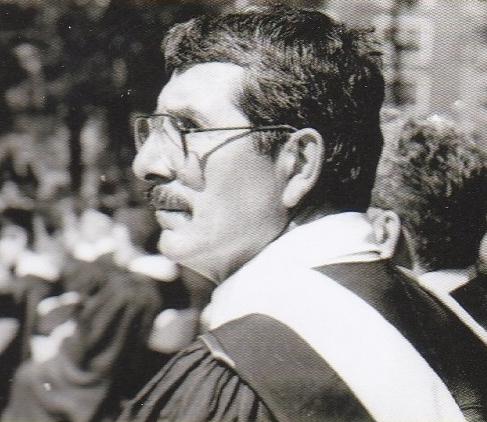
Image from the Mary E. Ambler Archives.
This is from a Lindenwood archives interview with the late John Nichols from 2011.
John Nichols: “Most people understood that, to co-exist with Spellmann, you had to not challenge him. You had to pretend like you were doing what he wanted you to do.”
KD: Nichols was a math professor at Lindenwood for decades, and was president of the American Association of University Professors at Lindenwood, a union of sorts designed to protect professors and academic freedom. This brought him into conflict with president Spellmann.
Glen Cerny: John was the lightning rod for a lot of Spellmann’s ire and attacks, and he intentionally invited it in many ways. I mean, John was willing to fight for what he believed was right.
KD: That’s Glen Cerny, a former Mass Communications professor who said Niccols was a mentor for him.
Spellmann’s policies, like eliminating tenure, were put in place under a declaration of financial exigency, because of the financial emergency Lindenwood was in when Spellmann came.
JN: “After about three or four years of Spellmann, the financial situation improved, so I wanted the faculty to discuss the possibility of urging the administration to lift financial exigency, that we were no longer in that state.”
KD: When Spellmann saw that this was on the AAUP’s agenda, he was perturbed.
JN: “Well, he got this agenda, and he called me on the telephone and said that we had no right to discuss this. I said “Dennis, leave me alone,” and hung up on him. I said, ‘We can discuss anything we want. In fact, we’d like for you to be there,’ so I finally hung up on him. That’s not the way to treat somebody. I fault myself for that. But he used to make me mad; I made him mad.”
KD: In 1993, Nichols went with his wife, who was the mayor of St. Charles, to attend the presidential inauguration of Bill Clinton, and missed three classes to do so.
When he got back on Jan. 21, Spellmann fired Nichols. Nichols said he then got barred from campus after Spellmann found out he attended a basketball game afterwards.
JN: “The security guy was crying. He said, ‘Mr. Nichols, I can’t let you on campus’ I said, ‘Look, I’m just going to my office to pick up a few things.’ And he was crying.”
KD: Students protested, and Nichols got his job back. But after the semester ended, his teaching contract was not renewed.
JN: “It was painful for me to accept the fact that it was time for me to get out of here, because, like I said, it was my family, and it was part of my life, but it was no longer. It was kind of like realizing that your family is gone. It was painful – but I could’ve buckled under and apologized for everything, and said I’ll do what you want me to do and come back here and teach. But you got to live with yourself.”
KD: After his upsetting departure, Nichols sued Lindenwood, in a last attempt to argue that he could not be terminated because he had been granted tenure before Spellmann became president.
But Lindenwood argued all tenure was abolished, even for existing tenured professors. The administration also claimed it was Nichols’ decision not to continue teaching there. But the St. Charles County Circuit Court ruled in Nichols favor, safeguarding the jobs of the professors who had tenure before Spellmann.
Nichols even took the case to the National Labor Relations Board, to argue that he was fired because of his membership with the American Association of University Professors. However, a judge dismissed his case, saying Nichols was “not worthy of belief,” and he “lost his own job” in the contract dispute.
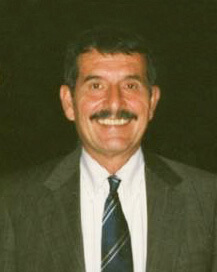
Photo from the St. Charles County Historical Society.
A report by an accrediting body in 1994 said Lindenwood had “an atmosphere of repression and fear of reprisal.” But the Rev. Dr. Mason says Spellmann’s Trump-esque “you’re fired” reputation was not accurate.
Michael Mason: There was this general understanding he would fire you on the spot, and I think what he did is not dissuade people from thinking that because I never knew him to fire somebody without way more than just cause.
KD: Eventually, faculty got more of a say in decision-making after a report from the higher learning commission, but tenure has never been restored.
Matt Hampton: Were there any protests on the part of faculty?
Professor Grant Hargate: Oh, yeah. But I think they were toothless.
KD: That’s our producer, Matt Hampton, talking with Grant Hargate, an art professor who’s been here since before Spellmann.
GH: I think faculty is always going to have an opinion. We are very intelligent, but sometimes the administration is also. We’re often insulted when they say, “This is what it costs us for you to do that,” because we think, “Well it should be done,” so sometimes, we’re not the most realistic.
MH: Some professors didn’t complain – but instead were just grateful for a paycheck and food to put on the table.
MM: Professors may not have liked him, but they got paid.
MH: Professors say Spellmann, surprisingly, was laissez-faire about what and how professors taught, but he always had direct control over how the school was run – and he kept a tight watch on expenses. Among them is Debbie Nicolai, a mass communications professor who has worked at Lindenwood since 1993.
Professor Debbie Nicolai: You had to have his signature on $25 worth of office supplies from the bookstore. He had to approve it. That’s how much of a micromanager he was. He wanted to be in charge of every detail. You didn’t do anything unless it through him first and got his D.S. on it. So I mean, that was I think that was just part of his personality, part of just being in charge.
MH: So do you think that kind of personality was necessary at the time?
DN: I think in the beginning, it was, but you know, I think maybe toward the end, I think people were having a hard time with it. They were almost feeling like, you know, I need some say too.
MH: Professor Reighard said Spellmann’s micromanaging had an upside: if everything had to go through him, that meant you only had to go through one man to get something done.
Richard Reighard: Just trying to get some of this stuff through all the bureaucracy nowadays is just like – I want to tear my hair out. God, I wish Spellmann was still here, because I could just go to see DCS and if he said “O.K., good boy, go for it,” boom, I had it.
MH: People called him that? DCS?
RR: Not to his face but but yeah, behind his back, they were all, “Ope, what’s DCS up to?”

Photo from the Mary E. Ambler Archives.
MH: For students, it was as if the times rewinded from the 80s to the 40s when Spellmann came in.
Chad Briesacher, the Director of Operations of KCLC, who graduated in 2008, said Spellmann would drive around in his Cadillac at night to enforce the 11 p.m. curfew.
Professor Chad Briesacher: If you didn’t have, like a job or a reason to be out after 11, you couldn’t be out after 11 on a weeknight and if you did, you got a ticket. And if you had three tickets, if memory serves me correctly, if you had three tickets during the semester, then you had to go to breakfast when the caf opened at 6 every day for the rest of the semester to prove that you could you know, get up and go to class and still be out late.
KD: Spellmann, who believed, “Idle hands are the devil’s workshop,” would also review students schedules personally, and add in morning classes just to keep them busy.
He cracked down on alcohol, banned co-ed dorms, and opposite-gender visitation was only allowed under narrow circumstances.
CB: They would always say, “If the dorm’s really good, no one in the dorm gets in trouble and it’s always picked up and clean, then you can get visitation,” – lounge visitation – never room visitation, and never fail, like as soon as a lounge got it, boom we would lose it again you know because they didn’t really want us to have it, I don’t think at the time. That was a Spellmann thing.
KD: Visitation was one of the first rules to be loosened up after Spellmann died, but the campus is dry to this day, and co-ed dorms only recently returned to two out of fourteen dorms.
Spellmann was also known for his particular hatred of hats.
Debbie Nicolai: If you would teach class, there would be people that would walk by and look in the window, in your classroom, and if they saw a student in the classroom wearing a hat, they came in and asked that student to remove their hat.
MH: That’s professor Nicolai again, who is also a Lindenwood alum.
DN: That was a Spellman thing. He was ex-military. He was from Texas, and you know, that’s a Texas thing. You take your hat off in the presence of a lady, young man, and he was teaching students to be respectful in his mind and you took the hat off when you walk in the door. He was grooming them to be professionals.
KD: And Spellmann’s obsession with people’s wardrobes extended beyond students’ hats, says Grant Hargate, an art professor.
Grant Hargate: He didn’t like the idea that I wore blue jeans. No professors wore blue jeans up till the time I came and I never did not wear them because, with paint and charcoal and clay, it would just get all over, and I just kept wearing them. Most of the professors on campus today wear blue jeans, Now the administration might like it or not like it, but that’s not their problem. They’re not in classrooms. But I was denied a promotion to full professor one year because of those blue jeans
KD: Because of those blue jeans.

Image from the Mary E. Ambler Archives
Besides Spellmann’s military background and Southern upbringing, some suspect his motivation for the abundance of rules was a marketing gimmick of sorts.
MH: Why did he want Lindenwood to have such strict rules?
Chad Briesacher: At the time, I mean, you didn’t really know, you knew that, that was the school you went to. I think looking back, I mean, now that I’m in my 30s and I’ve worked in higher education, I think looking back, I think that that was his sales pitch, you know, to parents, I think, you know, selling Lindenwood to parents – your kids aren’t gonna get in trouble here because we’re watching over them.
MH: According to some, the “Structure, Limits, and Morals” Spellmann’s Lindenwood gave students, reassured parents that their kids were safe.
Dr. Christie Rodgers: What folks didn’t hear him say behind the scenes is, it’s not like, I’m just going to take this away because I feel you’re children.
MH: That’s Dr. Christie Rodgers, Associate VP of Student and Academic Support Services.
CR: I would hear him say things like, “If I had my daughter in a dorm, and she wanted to sit in her dorm and study in her pajamas, but her roommate has a boyfriend and wants to bring that boyfriend into that room all the time, well, now, my daughter is uncomfortable because now here’s this guy in this room all the time, and this is her place where she should feel comfortable,” so that was more his reasoning of those types of situations and safety.
KD: But not all students felt the same way.
Administration was censoring the student newspaper, and the creative writing magazine was cut for publishing so-called indecent material.
There was only one way for students to freely express their bubbling discontent.
In the Fall of 1989, posters were plastered on campus advertising “The Black Squirrel. COMING SOON!” Later, a banner was hung behind Sibley Hall, which bore the Black Squirrel symbol and the phrase “In the black but out of touch,” protesting that Lindenwood, though “in the black” financially, did not listen to students’ concerns.
A straight jab at Spellman’s administration.
Then, anonymous pamphlets were placed in student and staff mailboxes containing a hand-written mission statement of the Black Squirrel movement.
“The Black Squirrel rejects the notion that the past is evil, and seeks only to convey the beauty of the Lindenwood legacy to the school’s new benefactors. To this end, The Black Squirrel has waged a propaganda campaign, and offered his symbol as a rallying point for all people of “the wood” who would join together to seek a return to a school that cares about students, not numbers. Give this to a friend.”
While continuing to encourage protests against Spellmann, the Black Squirrel distributed an underground newsletter with clippings from other newspapers of articles critical of Spellmann – including his history of questionable financial dealings at other schools. The students’ identities behind the Black Squirrel remain anonymous to this day.

Image from the Mary E. Ambler Archives
Later on, after Black Squirrel organizers most likely graduated, there was another underground paper which surfaced: THE YELLOW MOLE, which had a satirical tone and a header in ransom note-style cut and pasted letters.
A third protest newsletter, “Root Rot,” which surfaced in 1994, was sent to Lindenwood email inboxes via an anonymous server in Finland. It called itself “a journal of dissident news and views” and pretended to be written by “wee elves.” The people behind Root Rot had a list of five complaints:
- Student fees – What were they being used for? Why don’t students have a say in how they’re spent?
- Lack of medical services and counseling on campus
- They claimed campus security was corrupt and authoritarian.
- Academic resources were in a poor state and publications critical of Spellmann were often removed from the library.
- Repressive student policies and the lack of a free press
Lindenwood contacted the server to complain about the protest newsletter, and since the server did not allow spam — Root Rot was banned. And yet they found another way to continue their mass e-mailings.
Professor Reighard said that protests died out over a few years as students who tasted the freedom of Lindenwood before Spellmann graduated.
Richard Reighard: By then it was just like, well, nobody knew what the old Lindenwood was like, so the newer kids coming in, you know, other than, well, maybe they didn’t like the food in the cafeteria, or they didn’t like the fact that they couldn’t visit their girlfriend, in her dorm room or whatever. They didn’t have anything to compare to, so any protesting kind of fizzled.
KD: In the Spring of 1998, Lindenwood was shocked by the only homicide known to have occured on campus. Near the white water towers, a student found the body of a 13-year-old girl who had been brutally murdered.
Spellmann knew that the search for her killer was bad publicity for Lindenwood, so he barred media from campus and told students not to talk to the press,but it was to no avail, Professor Nicolai said.
Debbie Nicolai: We told to be quiet about it.I think they were telling students, “There’s media on every corner when you leave campus,” and you were asked not to stop and talk to them. I mean, and we’re communications so for them to tell our students that they did not really want you talking to the media, they would just go across the street and you know, engage.
KD: Because they were blocked from entering campus, desperate reporters tailed students and stopped them when they drove off campus to pepper them with questions.
It is also said Spellmann was even reluctant about the police searching rooms for evidence.
DN: That was kind of just Spellmann. He felt like we were we were, you know, Lindenwood, we were our own little township and to have someone come in and, you know, tell them what to do and how to do it, I think he did take a little bit of issue with that. But he still, you know, he knew that this was something that needed to be addressed, so, of course, he’s not gonna say don’t come on campus.
MH: Spellmann was said to be very territorial over Lindenwood and didn’t want any outside interference. Though he had experience in city management, he hated dealing with government bureaucracies.At the same time, he had friends in local government, including St. Charles County Executive Steve Ehlmann, who was on Lindenwood’s Board of Overseers as a State Senator.
One example is when Spellmann argued with a government agency over not having an affirmative action program to ensure minority representation among students.
Steve Ehlmann: He was in trouble because Lindenwood didn’t have an affirmative action program of some type, and he showed them that Lindenwood’s minority population was as high or higher than just about every other school in the state. And it’s like, well, they didn’t care, he didn’t have a policy. He had the results, but he didn’t he didn’t have a policy, so he was in trouble.
MH: Even though Spellmann had the numbers to show Latinos and African-Americans were well represented compared to other schools, he still couldn’t get out of making a policy.

Image from the Mary E. Ambler Archives
KD: Spellmann was motivated by a clear sense of purpose. The way he governed Lindenwood – which some might have labeled as conservative – was an expression of his personal beliefs and background, as well as practical in purpose.
When he worked for struggling institutions, he asked them “If this organization didn’t exist, would you recreate it?”
Richard Reighard: The stories are legendary about if you got him off on “visioning” we used to call it, talking about his vision for Lindenwood, he could talk for hours, he could just go on and on and on and on.
KD: Spellmann valued history and tradition and appreciated Lindenwood’s long history and made “frontier values” part of the college’s ethos. Lindenwood bought the Daniel Boone Home in Defiance, Missouri in 1998, and developed a program about pioneer heritage, but it proved impractical because the Boone Home was 30 minutes from campus. The school gave the property back to the County a few years ago.
Michael Mason: He was from a very different generation, than even for me It was what they called the Great Generation: World War II
MH: Dr. Michael Mason, a religion professor, said Spellmann found purpose in restoring and continuing Lindenwood’s founding mission of “enlightened, useful citizens.”
MM: His theme was, we’re gonna get you educated, and we’re going to make a good person out of you, and we’re going to make a better society because of that.
KD: Tune into our final episode to hear about the legacy Spellmann left after he passed away in 2006.



